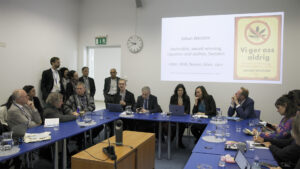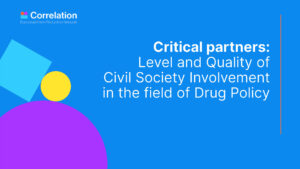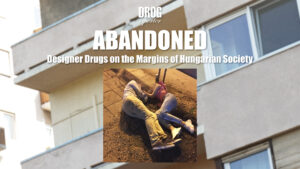There has been a media outcry about a leaked video in which the Finnish Prime Minister is partying with her friends. She is now accused of using cocaine. This whole scandal is a textbook example of what’s wrong with our attitudes to young people and drugs.
In the video the Finnish Prime Minister, Sanna Marin, is in an elevated mood, dancing with her friends. And that’s all.
But for the chorus of self-appointed protectors of public morality, this is scandalous.
“How terrible! She dares to feel good. What does this look like? Such an indecency. She represents a country for God’s sake! Is she a serious adult woman? How can she behave like a slut” – and so on.
Some media outlets are now accusing her of being under the influence of illegal drugs. Because they claim that one phrase – jauhojengi, meaning powder gang – from a leaked clip, refers to cocaine. Others contest and say that this word is more likely to be jallujengi, in reference to a Finnish alcoholic drink, Jaloviina.
The Prime Minister has now been called upon by the opposition to take a drug test (!) to prove that she is “innocent” and did not use any illegal substance. Ms. Marin said she is ready to undergo voluntary drug testing any time, because she “has never taken drugs”, she “only” drank alcohol.
This whole story is so wrong in multiple ways.
First: is it really a problem that a Prime Minister feels good with her friends and knows how to express her joy?
If this is disturbing to you, please “remove the beam out of your own eye, and then you can see clearly to remove the speck out of your brother’s eye” – as Jesus would say. We are surrounded with mature male politicians; imposing figures, who otherwise are corrupted, always ready to betray their principles, and undermine the rule of law. We tend to overlook their atrocities, we tolerate how they violate the human rights of minorities, how they undermine the future of the next generations.
They are hypocrites. Take for example Mr. József Szájer, the former head of the ruling Conservative, anti-LGBTQ Fidesz party’s faction at the European Parliament, and a key author of the new Christian-Conservative constitution of the Orban regime. Who was arrested during the COVID lockdown at an illegal gay chemsex party in Brussels, with Ecstasy pills in his backpack.
But if there is a young progressive female politician who dares to express her positive emotions, without any hypocrisy – she is immediately slut-shamed and ridiculed. This attitude stinks of misogyny.
It’s time to judge politicians by their work rather than by their gender or age. What did they do for the well-being, freedom, and health of their people? Their private life is only important if it contradicts their publicly represented principles. I bet that if we look at the political performance of Ms. Marin, she outran most male Conservative prime ministers in Europe.
I think if anything, she is a positive role model for young people: you can be in a serious position and still enjoy life, and you don’t need to take yourself too seriously. Too many young people live under pressure every day to be perfect, to always perform well. They are full of regret and shame, suppress their emotions, and feel too stiff to express them. They suffer but don’t know how to deal with suffering. This is the root cause of so many mental and behavioural disorders: the lack of ability to enjoy life and express this joy.
And here we come to drugs.
Did the Prime Minister use cocaine or “only” alcohol? Is this really the most important question? Nope.
It is important to clarify that alcohol is a drug, just like cocaine.
Drugs, either legal or illegal, are tools. Drugs are not the problem. They can be used for either good or bad.
If the person knows how to use drugs by adjusting the environment (setting) and the inner state (set) to minimise risks and maximise pleasure, drugs can be useful to explore, to enjoy, and to heal. The problems come when a person uses drugs to ease suffering and pain, to suppress negative emotions and to escape from an otherwise unbearable everyday reality. So in the end, the real problem is this reality – social exclusion, loneliness, trauma, untreated mental problems, shame, poverty, lack of social network etc. – and not the drug.
Alcohol use causes way more social and health harms than any other drug. Most alcohol users are recreational users, who are able to use the substance moderately, for fun. Most of the harms are experienced by a minority of heavy drinkers (and their families) who are unable to use alcohol moderately because they are unable to deal with the suffering caused by their poor social environment and the void in their souls left by trauma. And cocaine is not so different. According to a global study on cocaine use, prepared for the WHO, most cocaine users are recreational users, just like alcohol drinkers.
Drug tests may detect if a person has used a substance – but are completely useless to find out if the person has problems with substance use. For example, the test results may be negative for cocaine and the person can still suffer from drug problems. And the test may be positive for cocaine and the person can still be a recreational user who lives a happy and whole life.
It is time to change the way we think about drugs – and people who (may) use them. Punishing and shaming people never works as a motivator to change their lives. We need to end the hypocrisy and decriminalise all drugs – and invest in prevention, treatment, and harm reduction. Reforms are overdue in Finland (read this article) just like in other countries.
And it is time to change the way we think about joy. Because this is at the heart of the problem: a society that makes profits with the promise of joy but deprives young people of vital, meaningful social connections. Where it is a scandal if someone can express her emotions and joy – but where we tolerate the silent suffering of so many people.







